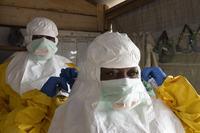Rare Ebola outbreak declared in Uganda |

[ad_1]

The UN World Health Organization (WHO ) said on Tuesday that a sample taken from a 24-year-old man was identified as the relatively rare Sudan strain.
It is the first time in more than a decade that the Sudan strain has been found in Uganda, which also saw an outbreak of the Zaire strain of Ebola virus in 2019.
Suspicious deaths
The latest outbreak follows six suspicious deaths in Mubende district so far this month. There are also eight suspected cases who are receiving care in a health facility.
Dr Matshidiso Moeti, World Health Organization Regional Director for Africa, said that the UN agency was working closely with Ugandan authorities to investigate the source, and support efforts to control it.
“Uganda is no stranger to effective Ebola control”, she said. “Thanks to its expertise, action has been taken to quickly to detect the virus and we can bank on this knowledge to halt the spread of infections.”
No effective vaccine
Existing vaccines against Ebola have proved effective against the Zaire strain but it is not clear if they will be as successful against the Sudan strain, WHO said in a statement.
Ebola is a severe, often fatal illness affecting humans and other primates. It has six different strains, three of which – Bundibugyo, Sudan and Zaire – have previously caused large outbreaks.
Case fatality rates of the Sudan strain have varied from 41 per cent to 100 per cent in past outbreaks. Early roll-out of supportive treatment has been shown to significantly reduce deaths from Ebola, WHO said.
Sending supplies
The agency has dispatched supplies to support the care of patients and is sending a specialized tent that will be used to isolate patients.
While ring vaccination of high-risk people with Ervebo (rVSV-ZEBOV) vaccine has been highly effective in controlling the spread of Ebola in recent outbreaks in DRC and elsewhere, said WHO, this vaccine has only been approved to protect against the Zaire strain.
Another vaccine produced by pharmaceutical company Johnson and Johnson may be effective but has yet to be specifically tested against the Sudan strain.
[ad_2]




